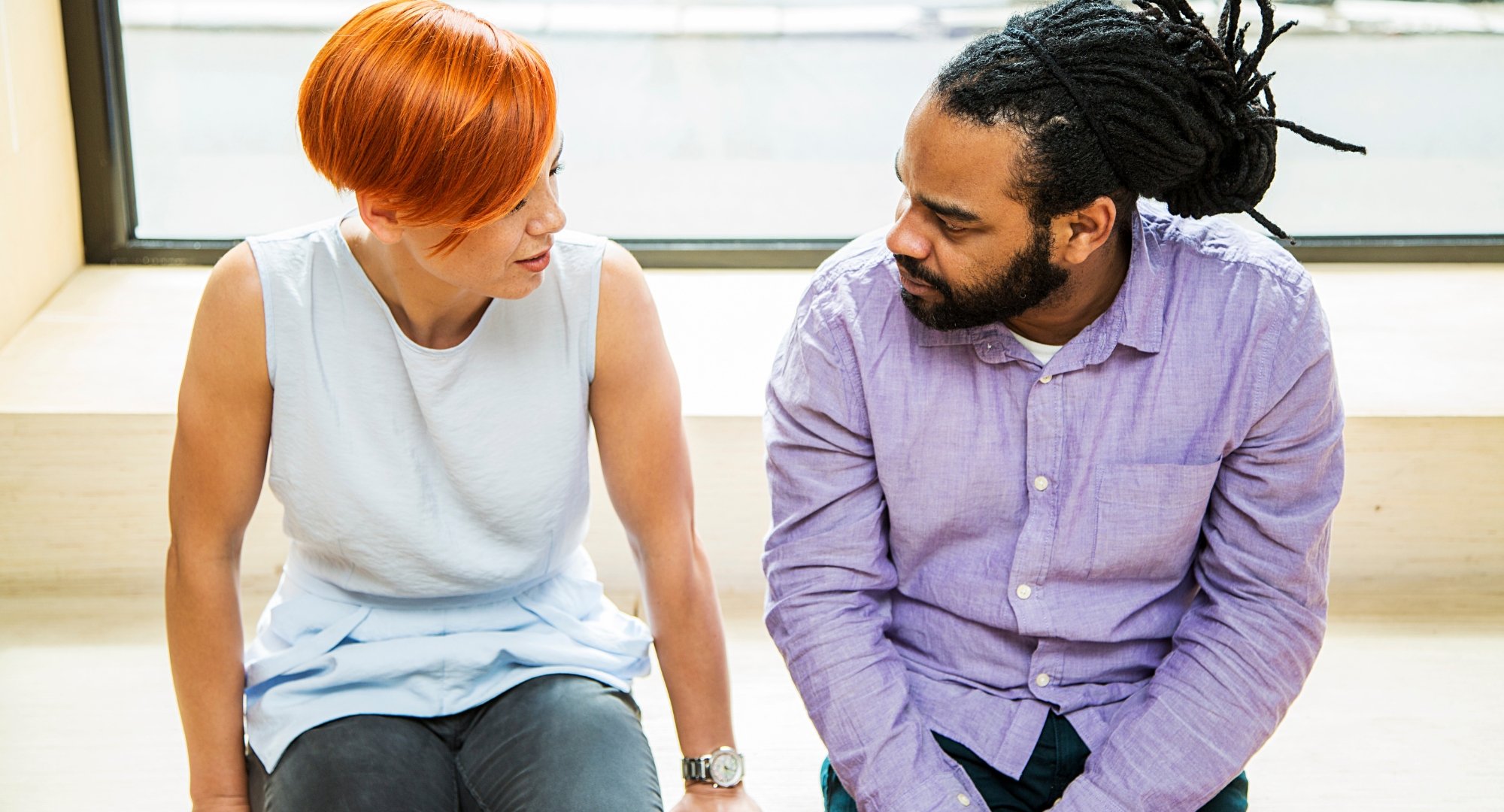
Everyone has different circumstances. Some may not be able or ready to leave an abusive relationship.
Below are more tips & resources to help you learn how to speak with and be a supportive person in a survivor’s life.
HOW TO TALK ABOUT IT
-
You never know who is around you. Statistically, there will be survivors of domestic violence within the spaces we exist. The way we react to and talk about domestic violence can impact how people engage with us.
If someone you know has experienced abuse, or you encounter a survivor seeking support, whether in your workplace or community, understanding how to talk about it with them is important. In general, talking about abuse can be difficult, sensitive, and vulnerable, even more so when a survivor may not be educated about abuse, or understand that they may have experienced abuse. Empathy is key. Keep in mind that they have likely experienced a multitude of lies, manipulation, and betrayal over a long period of time. They may be in a place of denial, doubt, confusion, depression, guilt, or shame for what they have gone through. Knowing what to say and what to stay away from can be vital in their recovery.
-
Sometimes people who have experienced abuse aren’t ready to share their full story. Asking for details of the experience (so you feel you have knowledge of the situation) can be harmful. It can make them feel like you don’t trust them, or you don’t believe them. Try to be a safe space for them, and be okay with silence. Your supportive presence is enough. Encourage them by saying things like, “I’ll always be here if you ever need to talk.” When the time is right and they do open up, be as validating as possible. Say things like, “Thank you for sharing this with me, “I appreciate you trusting me with this,” “You did nothing wrong,” and “This is not your fault.” Telling their story can be a vital way survivors heal from the trauma they’ve experienced.
-
Normalizing or relating to their experience can cause confusion. Normalizing their experience looks like saying things like, “One time my partner yelled at me too…” or “Yeah sometimes they just have to punch something to get the frustration out.” When you say things to relate to their experience, it can make what they are going through seem normal and that all relationships go through these conflicts. It is best to react in ways which reassure them that their experience was NOT normal, such as saying things like, “That is so dangerous,” or “That sounds terrifying.” This moment is about supporting them. You also want to try not to make it about yourself, where they may feel the need to switch roles and support you.
-
Victim blaming is when someone says, implies, or treats someone who has experienced harmful or abusive behavior as if it was a result of something they did or said, instead of placing the responsibility on the person that caused harm. Victim blaming exists on a spectrum and can include statements like “Why didn’t you leave sooner?,” “Well if you weren’t wearing that, you probably wouldn't have been assaulted,” and “Why didn’t you fight back?” Regardless of the statement, victim blaming is reinforcing the idea that the victim or survivor “allowed” or “asked for” the trauma to happen to them, rather than reinforcing that what they experienced was not their fault, and they didn’t deserve it.
Victim blaming not only discourages survivors from coming forward for fear that they may be blamed, it also moves the attention away from holding the person doing harm accountable. Be mindful not to say or ask statements that might cause someone to think they are at fault.
-
Having conversations with someone who has experienced abuse can be difficult. Sometimes, it can be hard to figure out how to address it.
If you want to shed light on unhealthy behaviors they have shared with you or that you may have witnessed, it is important to create a safe, non judgemental space for them to share. You want to center the conversation around the unhealthy behaviors in the relationship, and refrain from labeling the relationship as “abusive.” Using terms like this when someone may not be ready, don’t understand it, or think they are not experiencing abuse, can cause them to shut down or close off. This is why we want to focus on the specific behaviors or attitudes you are witnessing or hearing. A good example of something to say is, “It seems like your partner is calling and texting you a lot to figure out where you are, how do you feel about that?” This gets to it directly and opens space for them to share how they feel.
Instead of saying something is “abusive,” you can tenderly point out that something may seem unhealthy, and open up about how you would feel if you experienced that. Be careful not to make it about you, drawing the attention away from supporting them. This approach can help someone better understand what they are experiencing isn’t okay, and what they may be feeling is valid.
-
Providing survivors with validation can impact the way that they view their experiences. Validation can assure someone that they have a right to feel any emotion they may be feeling and that the experience or abuse was not their fault. It is a way to show them that you care, support, believe, and are there for them. You can offer validation repeatedly and tenderly.
Some validating statements may include “I believe you,” “This is not your fault,” You did nothing to deserve this,” “What they did or say was not okay,” or “You are not alone, I am here for you.” Sharing statements like this can help survivors better understand that what they experienced wasn’t “normal,” but something traumatic, and they deserve to take steps towards healing and safety.
-
Practicing active and reflective listening will help them feel heard and understood. Refrain from trying to “fix” the problem or give advice on what you would do. Remember, they are the experts of their life. Making it about you or what you would do, can take away from them in the moment. Try not to say things like, “Have you tried couples counseling?” or, “All relationships have conflict, you will get through this!”
Rather, practice active listening by being present and focusing on what is being said without trying to think of a response. Practice reflective listening by repeating back or summarizing what they have just told you in a response or question. This can look like saying, “It sounds like your partner is not treating you with respect and you seem to fear for your safety when these arguments happen, does that sound right?” By practicing active and reflective listening, you are focusing on their experience, helping them feel supported and understood.
Remember, you can always ask them directly what they need from your or what support looks like for them.
-
Asking clarifying questions when someone opens up can help them feel like you are interested and care about what they have gone through. Be careful when asking these questions, however, because you don’t want to make them feel like you are seeking details of the situation or reasoning for their behaviors–which can make them feel like you don’t trust or believe them. Stay away from “Why” questions. Rather, reassure them that you believe them, and ask questions like, “That’s terrifying, do you want to explore what next steps may be?” or “That sounds really scary, how did that make you feel?” These questions can help them get clarity around their own experiences while offering validation.
-
We want to make sure the person who was harmed is being supported. This can range from telling them you believe in them to accompanying them to court to being part of their safety plan. How we respond or don’t respond can have a significant impact. Don’t stay complicit or say things like “I don’t want to get involved.” Even if you care about both people involved, there are ways to provide support and resources.
We hope for a world where everyone is an active bystander and steps in when they see or hear harmful behaviors or attitudes. There are several ways to intervene, some of which include, addressing the behavior/attitude directly, causing a distraction, delegating and connecting with people around, documenting what you witness, and offering support afterward. The Hotline has a great article about tips for intervening when you witness domestic violence.
-
Becoming educated about abuse and domestic violence is probably one of the most important, most affordable, and most impactful ways you can help support survivors in your own life. When you become knowledgeable about abuse, you will be able to spot the warning signs in your friends’ or family members’ relationships, know how to help survivors create safety plans and escape, and be able to educate others about abuse.
Here are some practical ways you can educate yourself about abuse.
Read books, blogs, or listen to podcasts about abuse - Check out our library here.
Attend or host a domestic violence educational event - Many nonprofits have educational events, partnering events, or celebratory events for survivors of domestic violence. Additionally, SYTT offers educational domestic violence workshops for businesses, churches, and more. Contact help@sytt.org to inquire about hiring us to lead a workshop.
Become a domestic violence advocate - Most states provide a 40 or 60-hour training program to become a certified Domestic Violence Advocate. These trainings include: Abuse education of all demographics, statistics, legal education, trauma informed care, etc. If you would like to become an advocate, locate a shelter in your area. They will be able to refer you to sign-up for the next available training. Trainings vary in price and cost, and are often offered or quarterly or bi-yearly.
Listen to survivors - A great way to educate yourself is by listening to survivors and their stories. Practice active listening and empathy. Be aware of your body language and practice reflective listening by mirroring what you hear. Listen more, talk less, and refrain from trying to fix the problem. Check out NO MORE Silence, Speak Your Truth to read anonymous stories from survivors.
You can directly impact those experiencing and recovering from domestic violence!
Your generous contributions help us provide abuse education, resources, and emotional support to thousands of domestic violence survivors. Thank you for supporting our mission!

